牛津深圳版八年级英语下册Module 1 Unit 2 Body language. grammar 动名词课件 (共26张PPT)
文档属性
| 名称 | 牛津深圳版八年级英语下册Module 1 Unit 2 Body language. grammar 动名词课件 (共26张PPT) | 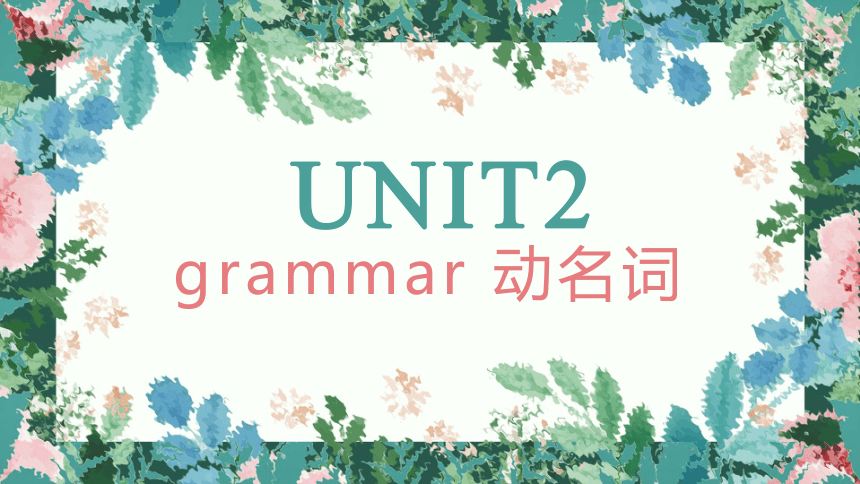 | |
| 格式 | pptx | ||
| 文件大小 | 2.0MB | ||
| 资源类型 | 教案 | ||
| 版本资源 | 牛津深圳版 | ||
| 科目 | 英语 | ||
| 更新时间 | 2022-06-18 23:55:48 | ||
图片预览

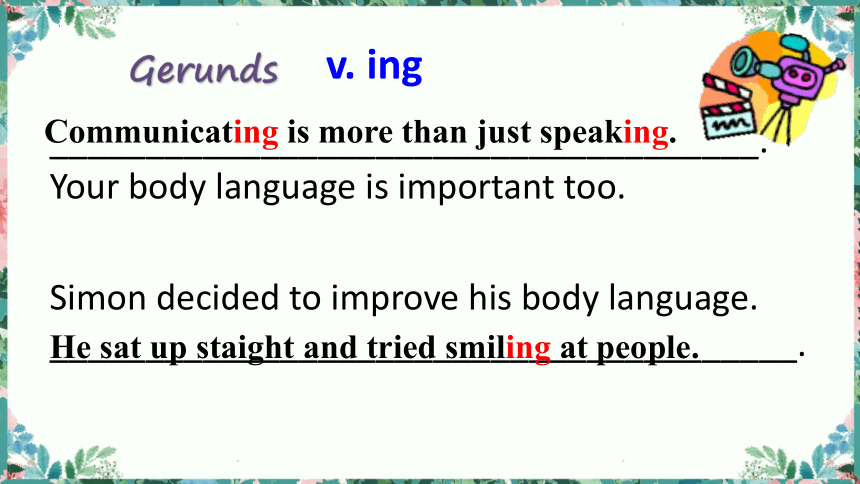
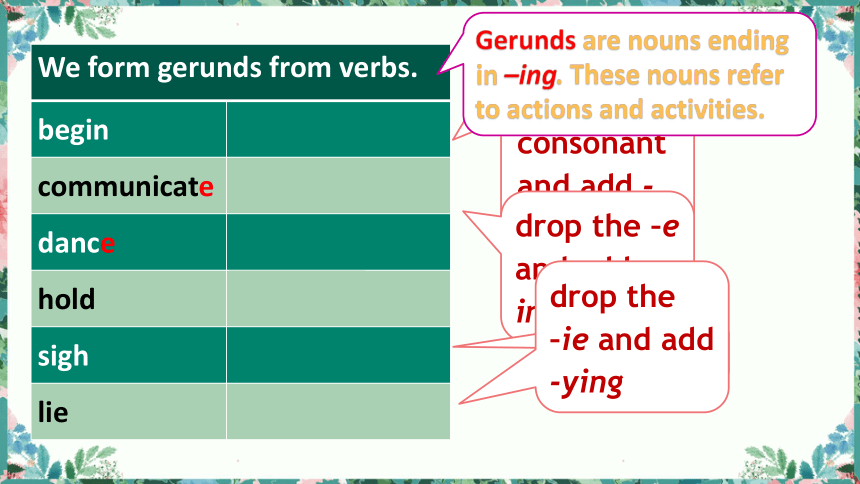
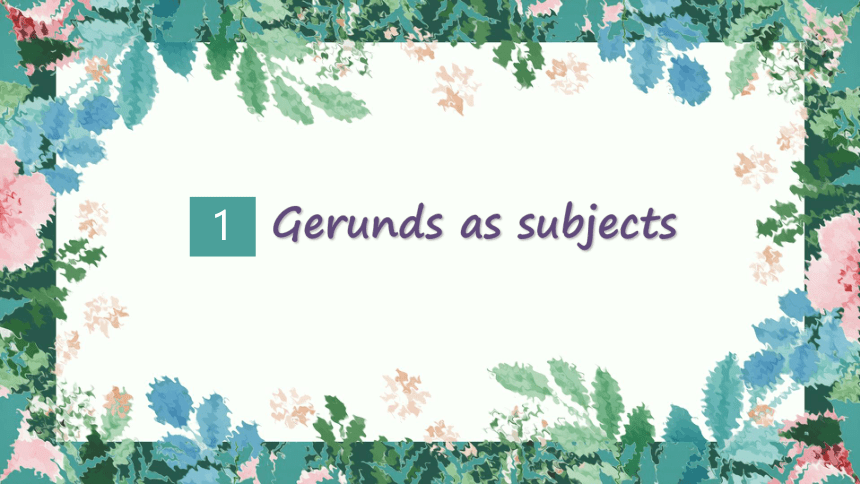
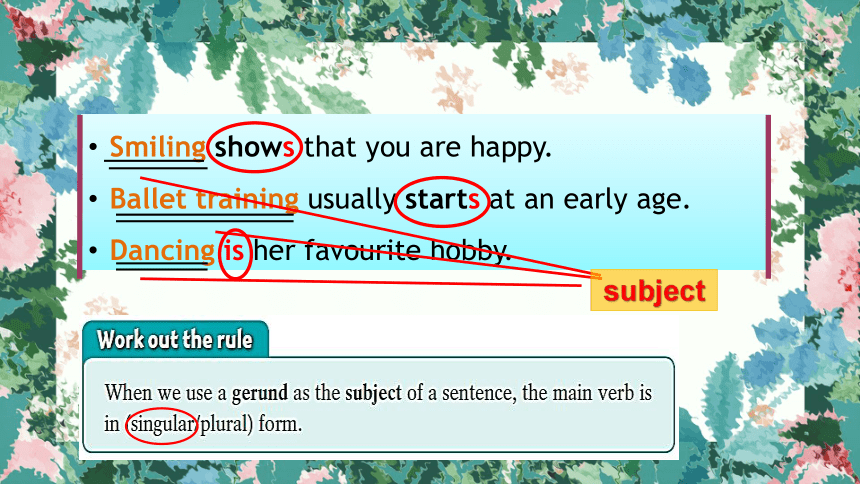
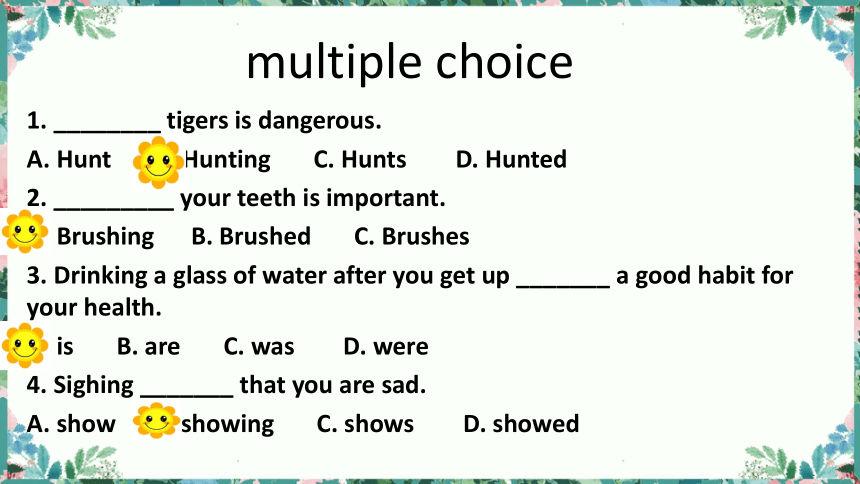
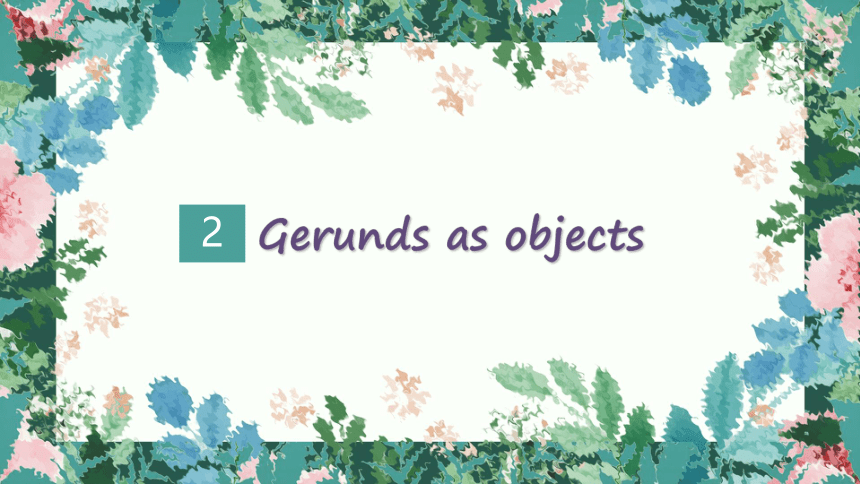
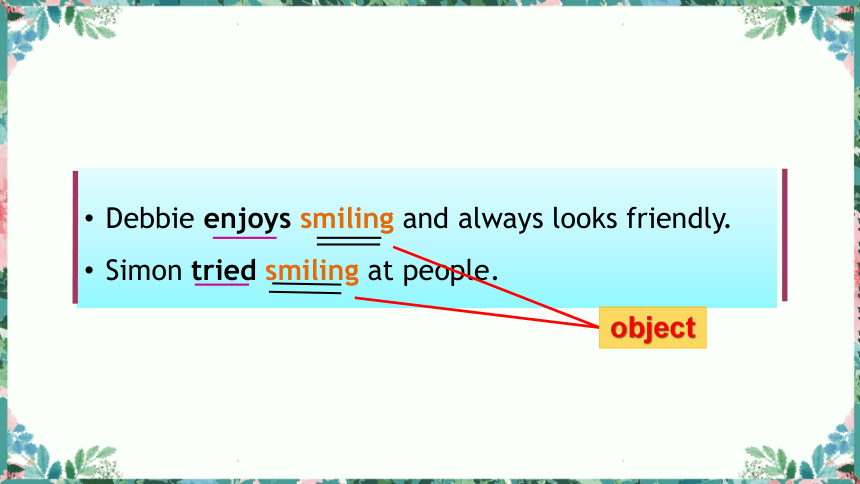
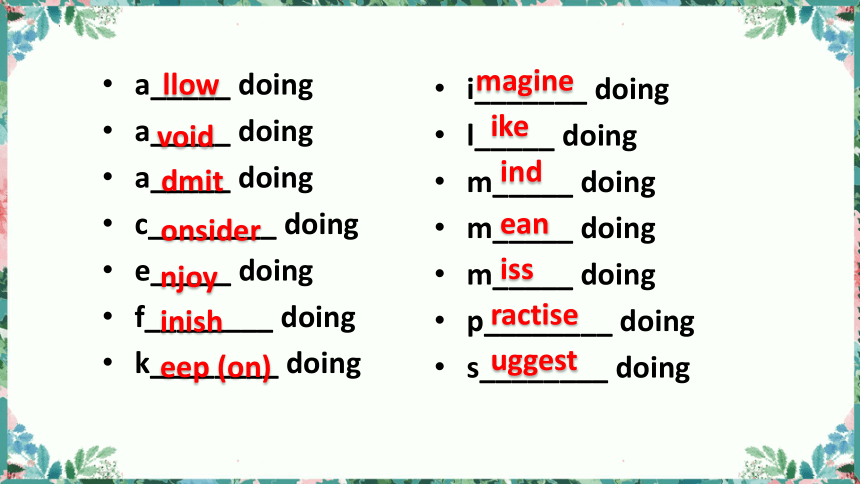
文档简介
(共26张PPT)
UNIT2
grammar 动名词
_____________________________________. Your body language is important too.
Simon decided to improve his body language. _______________________________________.
He sat up staight and tried smiling at people.
Communicating is more than just speaking.
v. ing
Gerunds
We form gerunds from verbs.
begin beginning
communicate communicating
dance dancing
hold holding
sigh sighing
lie lying
double the final consonant and add -ing
drop the –e and add -ing
add -ing
drop the –ie and add -ying
Gerunds are nouns ending in –ing. These nouns refer to actions and activities.
1
Gerunds as subjects
Smiling shows that you are happy.
Ballet training usually starts at an early age.
Dancing is her favourite hobby.
subject
multiple choice
1. ________ tigers is dangerous.
A. Hunt B. Hunting C. Hunts D. Hunted
2. _________ your teeth is important.
A. Brushing B. Brushed C. Brushes
3. Drinking a glass of water after you get up _______ a good habit for your health.
A. is B. are C. was D. were
4. Sighing _______ that you are sad.
A. show B. showing C. shows D. showed
2
Gerunds as objects
Debbie enjoys smiling and always looks friendly.
Simon tried smiling at people.
object
a_____ doing
a_____ doing
a_____ doing
c________ doing
e_____ doing
f________ doing
k________ doing
i_______ doing
l_____ doing
m_____ doing
m_____ doing
m_____ doing
p________ doing
s________ doing
llow
void
dmit
onsider
njoy
inish
eep (on)
magine
ike
ind
ean
iss
ractise
uggest
be ____________
be ____________
be ____________
c____________
f____________
g____________
h____________
l____________
p____________
used to doing
busy doing
worth doing
an't help doing
eel like doing
ive up doing
ook forward to doing
习惯做某事
忙于做某事
值得做某事
情不自禁做某事
想要做某事
放弃做某事
做某事有困难
盼望做某事
集中注意做某事
ave difficulty/ trouble (in) doing
ay attention to doing
In pairs, ask and answer questions about the pictures. Follow the example.
S1: What does the boy enjoy
S2: He enjoys reading books.
S1: What is the girl practising
S2: She is practising climbing mountains.
S1: What is the girl interested in
S2: She is interested in playing chess.
S1: What is the girl good at
S2: She is good at skiing.
We often use gerunds after these phrases.
be fond of
be interested in
be used to
keep on
think of
be good at
be tired of
give up
look forward to
feel like
介词后面直接跟的动词用ing形式
breathe do hear organize smoke take use walk
1 She is tired of ________ the dirty air in the city centre.
2 She keeps on ________ to school instead of _________ a bus.
3 He finally gave up ________.
4 She is used to ________ a handkerchief instead of a tissue.
5 She was interested in ________ the puzzle.
6 She looks forward to ________ from her new e-friend.
7 She is good at __________ party activities.
breathing
walking
smoking
using
doing
hearing
organizing
taking
Complete the sentences using the verbs in the box in the -ing form.
3
拓展
拓展
It's no good/ use doing sth
做某事没有好处/用处
固定搭配
4
REVISION
复习一
forget doing sth.
forget to do sth.
remember doing sth.
remember to do sth.
stop doing sth.
stop to do sth.
try doing sth.
try to do sth.
忘记做过(已做)
忘记要去做 (未做)
记得做过(已做)
记得要去做(未做)
停止正在做的
停下来去做另外一件事情
尝试着去做
尽力去做
1. On his way from the office, the businessman stopped ________(buy) some milk.
2. The little girl stopped_________(cry) when she saw her mother coming.
3. Do you still remember ________(go) to the concert with me ten years ago
4.Please remember __________(copy) the key points down in the class.
5. He was unhappy because is brother forgot __________(send) him a birthday present.
6. Jane’s mother totally forgot______(take) her medicine that morning, so she took it again in the afternoon.
7. Please take this key and try_________(open) the door.
8. You must try_________(be) more carful next time.
to buy
to send
taking
opening
to be
going
to copy
crying
复习二
see sb. do sth
see sb. doing sth.
hear sb. do sth.
hear sb. doing sth.
1. I saw a man _____ (enter) the room ten minutes
ago.
2. Yesterday morning we heard the little girl _____
(sing) an English song when we walked by the
room.
3. Did you see some children ___________(swim) in
the river at that time.
enter
singing
swimming
5
EXERCISE
_________(take) a walk for a while after meals is good for our health.
She spends her time watching TV instead of ________(study).
It’s important _________finish) the work on time.
My father wasn’t happy, because I forgot ________(do) my homework.
In order to learn English well, you need to practice _______ (speak) English more and more.
You’d better _______(take) the medicine on time.
Lily couldn’t stop _______(cry) when she heard the bad news.
Taking
studying
to finish
to do
speaking
take
crying
8. When you leave the office, please do not forget ________(turn) off the lights.
9. Please remind me about ________(buy) a present for my mother.
10. When I was a child, I once dreamt of ________(receive) a letter from the queen in the UK.
11. Do you have trouble ________(talk) to people with intellectual disabilities
12. My grandparents are used to _______(live) in the city now.
13. Do you mind my __________(smoke) here
to turn
buying
receiving
talking
living
smoking
14. A computer is very useful. But ________(chat) with others on the Internet wastes too much time.
15. When we saw him, the old man was busy ________(tie) the horse to the tree.
16. Keep ________(do) your homework, and you’ll finish it soon.
17. Look! People were busy ________(clean) the snow from the streets.
18.– What can we use computers for
-- ________(send) e-mail.
19. ________(tell) your problems to your friends will help you feel better.
chatting
tying
doing
cleaning
Sending
Telling
Thank you!
UNIT2
grammar 动名词
_____________________________________. Your body language is important too.
Simon decided to improve his body language. _______________________________________.
He sat up staight and tried smiling at people.
Communicating is more than just speaking.
v. ing
Gerunds
We form gerunds from verbs.
begin beginning
communicate communicating
dance dancing
hold holding
sigh sighing
lie lying
double the final consonant and add -ing
drop the –e and add -ing
add -ing
drop the –ie and add -ying
Gerunds are nouns ending in –ing. These nouns refer to actions and activities.
1
Gerunds as subjects
Smiling shows that you are happy.
Ballet training usually starts at an early age.
Dancing is her favourite hobby.
subject
multiple choice
1. ________ tigers is dangerous.
A. Hunt B. Hunting C. Hunts D. Hunted
2. _________ your teeth is important.
A. Brushing B. Brushed C. Brushes
3. Drinking a glass of water after you get up _______ a good habit for your health.
A. is B. are C. was D. were
4. Sighing _______ that you are sad.
A. show B. showing C. shows D. showed
2
Gerunds as objects
Debbie enjoys smiling and always looks friendly.
Simon tried smiling at people.
object
a_____ doing
a_____ doing
a_____ doing
c________ doing
e_____ doing
f________ doing
k________ doing
i_______ doing
l_____ doing
m_____ doing
m_____ doing
m_____ doing
p________ doing
s________ doing
llow
void
dmit
onsider
njoy
inish
eep (on)
magine
ike
ind
ean
iss
ractise
uggest
be ____________
be ____________
be ____________
c____________
f____________
g____________
h____________
l____________
p____________
used to doing
busy doing
worth doing
an't help doing
eel like doing
ive up doing
ook forward to doing
习惯做某事
忙于做某事
值得做某事
情不自禁做某事
想要做某事
放弃做某事
做某事有困难
盼望做某事
集中注意做某事
ave difficulty/ trouble (in) doing
ay attention to doing
In pairs, ask and answer questions about the pictures. Follow the example.
S1: What does the boy enjoy
S2: He enjoys reading books.
S1: What is the girl practising
S2: She is practising climbing mountains.
S1: What is the girl interested in
S2: She is interested in playing chess.
S1: What is the girl good at
S2: She is good at skiing.
We often use gerunds after these phrases.
be fond of
be interested in
be used to
keep on
think of
be good at
be tired of
give up
look forward to
feel like
介词后面直接跟的动词用ing形式
breathe do hear organize smoke take use walk
1 She is tired of ________ the dirty air in the city centre.
2 She keeps on ________ to school instead of _________ a bus.
3 He finally gave up ________.
4 She is used to ________ a handkerchief instead of a tissue.
5 She was interested in ________ the puzzle.
6 She looks forward to ________ from her new e-friend.
7 She is good at __________ party activities.
breathing
walking
smoking
using
doing
hearing
organizing
taking
Complete the sentences using the verbs in the box in the -ing form.
3
拓展
拓展
It's no good/ use doing sth
做某事没有好处/用处
固定搭配
4
REVISION
复习一
forget doing sth.
forget to do sth.
remember doing sth.
remember to do sth.
stop doing sth.
stop to do sth.
try doing sth.
try to do sth.
忘记做过(已做)
忘记要去做 (未做)
记得做过(已做)
记得要去做(未做)
停止正在做的
停下来去做另外一件事情
尝试着去做
尽力去做
1. On his way from the office, the businessman stopped ________(buy) some milk.
2. The little girl stopped_________(cry) when she saw her mother coming.
3. Do you still remember ________(go) to the concert with me ten years ago
4.Please remember __________(copy) the key points down in the class.
5. He was unhappy because is brother forgot __________(send) him a birthday present.
6. Jane’s mother totally forgot______(take) her medicine that morning, so she took it again in the afternoon.
7. Please take this key and try_________(open) the door.
8. You must try_________(be) more carful next time.
to buy
to send
taking
opening
to be
going
to copy
crying
复习二
see sb. do sth
see sb. doing sth.
hear sb. do sth.
hear sb. doing sth.
1. I saw a man _____ (enter) the room ten minutes
ago.
2. Yesterday morning we heard the little girl _____
(sing) an English song when we walked by the
room.
3. Did you see some children ___________(swim) in
the river at that time.
enter
singing
swimming
5
EXERCISE
_________(take) a walk for a while after meals is good for our health.
She spends her time watching TV instead of ________(study).
It’s important _________finish) the work on time.
My father wasn’t happy, because I forgot ________(do) my homework.
In order to learn English well, you need to practice _______ (speak) English more and more.
You’d better _______(take) the medicine on time.
Lily couldn’t stop _______(cry) when she heard the bad news.
Taking
studying
to finish
to do
speaking
take
crying
8. When you leave the office, please do not forget ________(turn) off the lights.
9. Please remind me about ________(buy) a present for my mother.
10. When I was a child, I once dreamt of ________(receive) a letter from the queen in the UK.
11. Do you have trouble ________(talk) to people with intellectual disabilities
12. My grandparents are used to _______(live) in the city now.
13. Do you mind my __________(smoke) here
to turn
buying
receiving
talking
living
smoking
14. A computer is very useful. But ________(chat) with others on the Internet wastes too much time.
15. When we saw him, the old man was busy ________(tie) the horse to the tree.
16. Keep ________(do) your homework, and you’ll finish it soon.
17. Look! People were busy ________(clean) the snow from the streets.
18.– What can we use computers for
-- ________(send) e-mail.
19. ________(tell) your problems to your friends will help you feel better.
chatting
tying
doing
cleaning
Sending
Telling
Thank you!
同课章节目录
